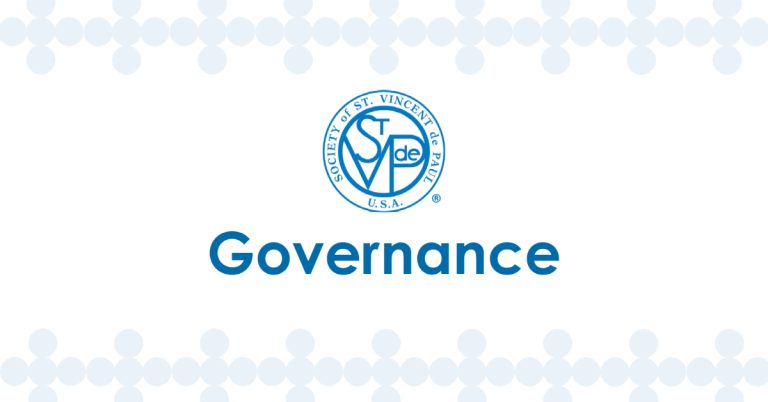This week we offer more insightful and actionable information from the “Retaining Your Members” section of Vincentian Life: Conference.
- Provide recognition. In the business workplace, when someone asks the question, “what do you want from your boss in your job,” the two top answers are always security and recognition.
- Recognize long-time members (at 5, 10, 15, 20, 25 year, and other anniversaries), those who continue to be active past the age of 80, and all retiring members.
- Recognize your pastor, priests, deacons, and nuns who provide help and support for your programs and/or your Conference. We sometimes forget who pays the electric bill for our pantry.
- Conduct a “graduation ceremony” when a member completes the Ozanam Orientation. Recognize them in front of the entire Conference at your next meeting.
- Use a star or other special character on your Conference membership list to indicate members who have completed the Ozanam Orientation.
- Prepare and publish a list of Conference officers over past years. List all Vincentians who made the Quarter Century Club.
- Put up a plaque in your pantry with the names of Vincentians who passed to their eternal reward while serving the poor. Add a new name plate each time a member dies, conducting a short prayer service.
- Recognize the need for recovery and recuperation. Occasionally a member may become dissatisfied or bored with their present assignment. Others may get tired (especially your oldest members), and a few may experience burnout. Remember that a person’s family and job come first according to the Society’s own Rule.
- Recognize these folks and thank them for the work they have accomplished, and show them how their involvement has helped the people the Conference served and our Society. Ask them for input on the manner in which you conduct your meetings and make assignments. They may have a different perspective, and help you to improve Conference operations. After positively dealing with the situation they find themselves in, discuss other positions which may be more attractive to them.
- Everyone in your Conference will get tired of the “same old thing,” so keep trying new projects and changing (improving) old programs. The attitude, “but we’ve always done it that way” will only insure that your Conference remains a handful of old men and women, as you drive away new and younger people and burn out older ones.
- A perception that an organization is dying is the number one reason why people leave or fail to join an organization. The vibrant Conference will keep existing members and attract new members.
- Work on (and pray over) personality conflicts. Personality conflicts are inevitable in any group of humans. Yet, if these are not managed, they will cause you to lose at least one of the two protagonists. The President and Spiritual Advisor should try to help resolve any issues between the warring partners. It may be necessary to separate these people until, over time, they get to better know (and respect) each other in new ways. Change Home Visit teams, schedule the Hatfields in at times when the McCoys aren’t there. Time heals all wounds; give it a chance. And pray that the Peace of Christ descends on both of them.
- Equip your people to do their job.
- Information. Your Conference does more than pass out food and money; you provide information which is often essential for guests to get back on their feet. Your members must have that information to do their job.
- Publish a year’s calendar so Active Members, Associate Members, and regular donors, as well as your clergy, Parish Council, and other church ministries, know what the Conference is planning and when. This helps prevent conflicts, helps people reserve dates when you need their participation, and helps communicate the breadth of your Conference work.
- Adopt and communicate Conference policies and guidelines. Home Visit teams especially must know what latitude they have when working with a family in trouble. Nothing is more frustrating than having the responsibility for a case without the authority required to act. Home Visit teams should know one of three conditions exist when they visit:
- That they cannot help a family financially with rent due to lack of funds, and must help in other ways — referrals, information, counseling, extra food, etc.;
- That they cannot help a family with rent without the approval of the Conference which meets sometime down the road;
- That they can help a family with rent up to “X” dollars without further approval — beyond that amount, Conference approval is requireNecessary referral forms and vouchers (for clothing, gasoline, groceries, furniture) should be available and members instructed on how to properly complete them. The Conference pays its bills faithfully and promptly so vouchers given to guests are honored by thrift stores and other vendors.
-
- Necessary referral forms and vouchers (for clothing, gasoline, groceries, furniture) should be available and members instructed on how to properly complete them. The Conference pays its bills faithfully and promptly so vouchers given to guests are honored by thrift stores and other vendors.
- Recognize the value of fellowship and friendship. Don’t forget to schedule social events. The Society’s second objective requires a friendship relationship among members. People are social beings, and personal relationships help cement one’s commitment to the common work. Sometimes this can be combined with retraining (below).
- Retraining. Retraining should occur periodically. We all need to be reminded of basic job duties, of things that have become more important in recent years, and of how to handle new forms, procedures and program changes. Older members not kept up to date can feel “lost” and out of touch. Get all your folks together for refresher training at least every six months. A good way of handling this is to schedule a social activity and combine the two. A summer barbecue can involve socializing and eating, followed by a 90-minute refresher course, or vice versa.
- Never forget spirituality. People joined the Society of St. Vincent de Paul — not the American Cancer Society, or the United Way, or the Red Cross. What separates the Society from these very worthwhile organizations is the fact that we are a faith-based organization; we bring spiritual values to the people we serve.
Burnout is common after a relatively short time in most other volunteer agencies because the members don’t have a belief system to sustain them. We can always fall back on our faith. That is the reason we have members well into their 80’s and even 90’s who have been serving in the dining rooms, stores and other special works for more than 50 years.
Whether old or new, your members have a “thirst” for spirituality. They need to be reminded of the spiritual aspects of their work. If you only talk about the “numbers” — boxes delivered, money raised, families visited, hours worked — you will find members losing focus.
Even in the very best Conferences, teams experience discouraging cases. They “get taken” by fraudulent couples. And, after a series of thankless guests, greedy applicants, lazy individuals and indifferent bureaucrats, those without a spiritual foundation will be “lost” to despair and discouragement.
Our spirituality is our anchor. Keep it present at all times. First things first. Never become a Conference of just “numbers.”



